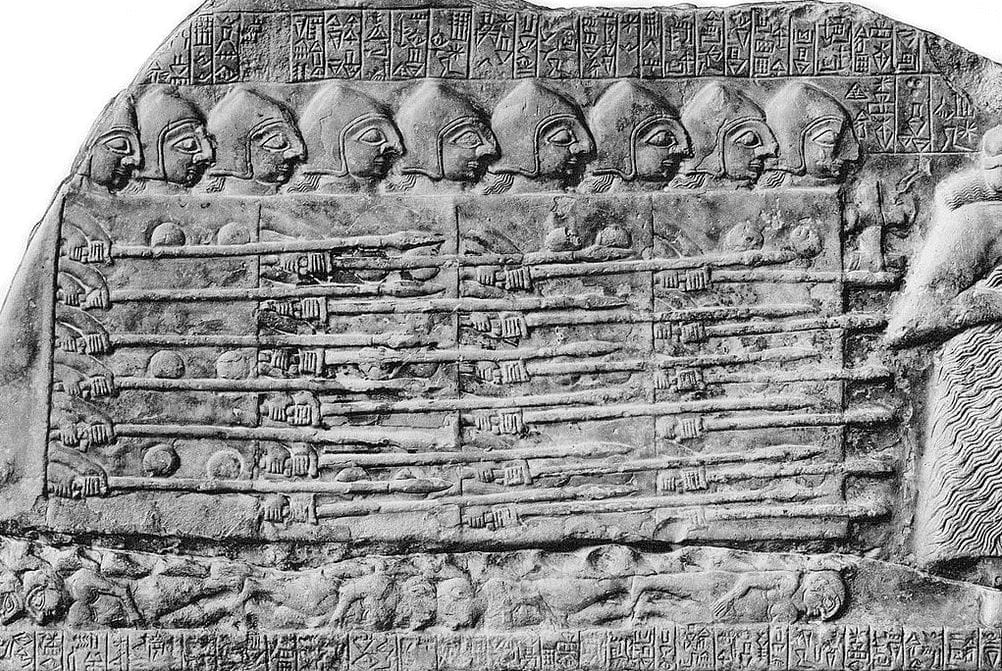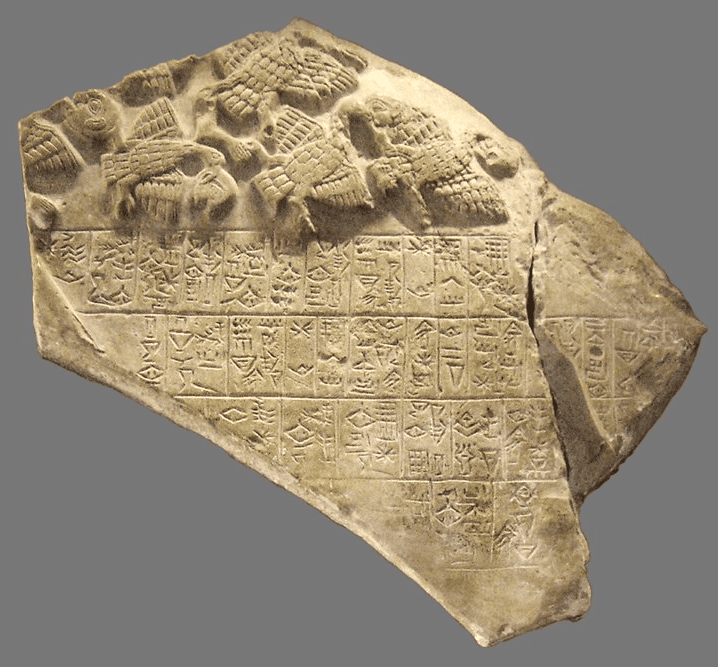Barry Meisenberg
Baltimore, Maryland, United States


Limestone fragments of the “Vulture Stele” now in the Louvre Museum, Paris, France. A stele is a stone pillar erected as a monument to some great event. This stele was created circa 2500 BC to celebrate the victory of King Eannatum of Lagash over Ush, king of Umma. In the fragment depicting war (left), the king can be seen at the head of his troops trampling the bodies of the defeated enemy. Another fragment (right) shows vultures carrying away the severed heads of the enemy soldiers, a notable form of disrespect to those soldiers deprived of burial.
The selected fragments reveal that not much has changed in human warfare over 4500 years. As the poem suggests, this predilection to cruel war is part, but not all, of the human endowment.
Fragment depicting war (left). Published in Découvertes en Chaldée by Ernest de Sarzec, 1886. Via Wikimedia. Public domain.
Fragment depicting vultures (right). Photo by Eric Gaba (Sting) on Wikimedia. CC BY-SA 3.0.
Images of a distant war flicker on my screen calling forth anger and sadness.
Through tears, I see a war that prizes as targets hospitals like mine, the
humans within seeking sanctuary, and those in the white coats who carry comfort.
Some images resist easy dismissal from the mind’s eye:
frantic CPR by an ER team in Mariupol on a 6-year-old girl who, unsuspecting,
went to Sunday market just as a rocket completed its airborne journey alongside her.
The smiling pink kittens on her blood-soaked pants and her pale fragile body
no match for the hard metal of the uncaring, powerful rocket, cynically launched. Days later,
in the same city, a woman with protruding pregnant abdomen is borne away
from a maternity hospital intentionally bombed into ruins.
A photographer captures the story in a single frame:
pale and stunned patient, determined stretcher bearers, massive bomb-cavity,
a hospital with shorn façade,
burned and splintered tree stumps littering the landscape foreshadowing the
fate of mother and her never-to-be-born child.
It wasn’t the gore that called forth my tears—I’ve seen bloodletting before.
It wasn’t the anguish of a dead child’s parents—I’ve seen grief-stunned stares before.
Rather, it was shame.
Shame that attacks on hospitals in the last war were
mere prelude to attacks on hospitals in this war.
Shame that despite the honors bestowed on poets and artists who disparaged war,
no honored poems or paintings prevented this calamity.
Shame that the ancient and perhaps genomic appetite for conquest had yet again loosed the Pale Horse.
On screen, I see the parents of the 6-year-old stare blankly into a stranger’s camera,
their treasure now gray and lifeless, their grief bottomless.
On video, debris-covered survivors of the blasted maternity hospital mill about in astonishment,
beseeching eyes demanding of me, of all, “How could this happen?” Who has an answer?
I see too the CPR team grieving the loss of their petite patient, crying, cursing, or staring numbly.
Oh, I long to go and sit in silence beside each of them, like the mourners who comforted Job.
Saying nothing, because there is nothing to say.
Allowing mere presence to convey, “I saw and I care; the world saw, and the world cares.”
Safe in my study half a globe away, I think about you dear colleagues, those I’ve glimpsed on
TV and others I can only imagine, striving bravely far from the camera’s eye.
Will you ever recover from the heartache and fury of these days?
Your families, burdened with worry, surely know you cannot be spared.
Thank you, dear colleagues, for demonstrating what I desperately needed to see:
that physicians can inspire with courage and sacrifice.
Look proudly on what you have delivered to your students: a living of example of valor in
deeds, not words. They should, at once, prize the example and pray never to reproduce it.
Through my tears, dear colleagues, I honor you, for it is written,
“To save one life is to save an entire world.”
BARRY MEISENBERG, MD, is a practicing hematologist and oncologist and Visiting Professor of Oncology at the Johns Hopkins School of Medicine. He serves as Chair, Dept of Medicine and Medical Director, Academic Affairs at Luminis Health. An uncredited version of this poem was read aloud at the Luminis Health Diastole Hour, a medical humanities discussion session for the medical staff at Luminis Health, Annapolis, MD.
